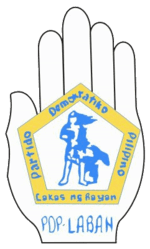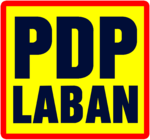PDP–Laban
| PDP-Laban | |
|---|---|
 | |
| President | Aquilino Pimentel III |
| Chairman | Rodrigo Duterte |
| Secretary-General | Martin Diño |
| Founded | 1982[1] |
| Headquarters | Metro Manila |
| Ideology |
Asian values Federalism[2] |
| Political position | Center-left |
| Colors | Yellow, Dark Blue, Red |
| Seats in the Senate |
1 / 24 |
| Seats in the House of Representatives |
0 / 292 |
| Provincial governorships |
1 / 81 |
| Provincial vice governorships |
0 / 81 |
| Provincial board members |
4 / 1,006 |
| Website | |
|
www | |
|
Politics of Philippines Political parties Elections | |

The Partido Demokratiko Pilipino-Lakas ng Bayan (lit. Philippine Democratic Party-People's Power), more commonly known as PDP–Laban, is a political party in the Philippines.
History
The party now known as PDP–Laban is the result of a merger between the Partido Demokratiko Pilipino and Lakas ng Bayan.
Partido Demokratiko Pilipino (PDP) was founded in 1982 by Aquilino Pimentel, Jr. and a group of protesters against the authoritarian government of Ferdinand Marcos, the 10th President of the Philippines. These protesters include the leaders of Davao City and Cagayan de Oro City, such as Zafiro L. Respicio, Rey Magno Teves, Cesar R. Ledesma, Samuel Oceña, Crispin Lanorias and Morgs Cua.
Merger
By 1983, PDP had formed a coalition with the Lakas ng Bayan (Filipino for "Strength of the Nation") party, founded earlier by former Senator Benigno Aquino, Jr. in 1978.
In 1986, the two groups merged to form the Partido Demokratiko Pilipino-Lakas ng Bayan or PDP LABAN. At that period, PDP LABAN became the single biggest opposition group to run against the presidency of Ferdinand Marcos in the 1986 Snap Presidential elections. Corazón, the widow of the assassinated Senator Aquino, was the party's nominee for President that year. Aquino was persuaded to run by businessman, newspaperman and street parliamentarian Joaquin Roces, who was convinced that Aquino would have the biggest chance to defeat Marcos in the polls. Roces started the "Cory Aquino for President" movement to gather one million voters in one week to urge Aquino to run as president.
However, another opposition group led by Senator Salvador Laurel of Batangas was also participating in the election, with Laurel as its presidential bet. Before the election, Aquino approached Laurel and offered to give up her allegiance to the PDP-LABAN party, and run as president under Laurel's United Nationalist Democratic Organization (UNIDO) party. Laurel became the nominee for Vice President. He also approached Aquino, offering her the Vice Presidential nomination of UNIDO or Unity. In the end, Laurel became the Vice Presidential running-mate of Aquino, after being convinced to do so by the Archbishop of Manila, Jaime Cardinal Sin. PDP LABAN aligned itself with UNIDO, which became the main group and leader of the coalition which opposed Marcos. After the People Power Revolution of 1986, which saw Aquino and Laurel being proclaimed President and Vice President, respectively, PDP LABAN continued its allegiance with UNIDO, until the latter's dissolution in 1987. In 1988, PDP LABAN was split into two factions: the Pimentel Wing of Aquilino Pimentel, Jr. and the Cojuangco Wing of Jose Cojuangco, Jr.. The Cojuangco Wing and the Lakas ng Bayan party of House Speaker Ramon Mitra, Jr. merged in 1988 to form the Laban ng Demokratikong Pilipino party.
Mission and Vision
PDP LABAN seeks a peaceful and democratic way of life characterized by:
- Freedom
- Solidarity
- Justice, Equity, and Social Responsibility
- Self-reliance and Efficiency
- Enlightened Nationalism
- Federal System of Government
The Five Basic Party Principles
- Theism
- Authentic Humanism
- Enlightened Nationalism
- Democratic Centrist Socialism
- Consultative and Participative Democracy
PDP-LABAN Today
PDP LABAN today is headed by its president, Sen. Aquilino "Koko" Pimentel III, after incumbent Vice-President of the Philippines, Hon. Jejomar Binay resigned as party chairman and left the party. The party is currently re-grouping and there are some movements of expansion especially in Mindanao, where it originated, particularly in Davao region and two of its founders, Crispin Lanorias and Cesar Ledesma, are again active in the recent party activities. The party with the guidance of the senior members and its new and young idealistic and nationalistic members is hoping it will once again rise to be the biggest political party in the Philippines.
Notable members
Party leaders
- Aquilino "Koko" Pimentel III – Current Senator of the Philippines - President of the Party
- Rodrigo Duterte – Mayor from Davao City - National Chairman[3]
- Salvador Ty - Vice President of the party
- Aquilino "Nene" Pimentel, Jr. – Former Senate President from Cagayan de Oro - Founder
Other notable members
- Allan L. Rellon – Tagum City mayor
2016 Presidential Candidate
- Rodrigo Duterte (formally announced candidacy on November 21, 2015 and officially filed COC on November 27 and December 8)
- Martin Diño (filed his candidacy on October 16, 2015 and withdrawn on October 29) – Chairman of the Volunteers Against Crime and Corruption; also Secretary-General of the party
Note: Diño earlier stated that had he withdrawn his intention to run for president, Davao City Mayor Rodrigo Duterte would be his substitute.[4]
References
- ↑ BINAY INDUCTS NEW PDP-LABAN MEMBERS IN GMA, CAVITE - "...the PDP, established in 1982... Archived July 23, 2011 at the Wayback Machine
- ↑ http://www.gmanetwork.com/news/story/441711/ulatfilipino/balitangpinoy/duterte-posibleng-maging-standard-bearer-ng-pdp-laban-sa-2016-polls-pimentel
- ↑ "Duterte is new PDP-Laban chair". Philippine Daily Inquirer. February 7, 2016. Retrieved February 7, 2016.
- ↑ "PDP-Laban decision final: Duterte to substitute if Diño withdraws presidential bid". CNN Philippines. Retrieved 2015-10-27.
External links
| ||||||||||||||||||||||||
